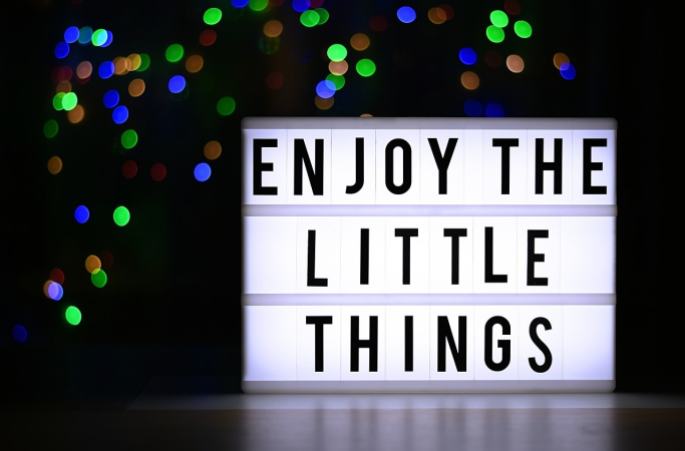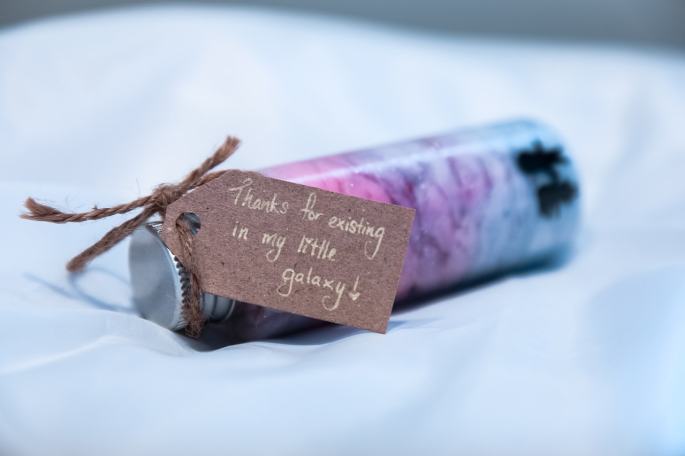Around Thanksgiving when you were a kid, do you remember having to write down something you were grateful for usually on a paper plate that was meant to be decorated as a turkey? Whether it was with your palm print and some finger paint or some cut out construction paper, it usually involved a paper plate. I’m not sure why that paper plate is so memorable to me. I guess I just did this often enough in school. Anyways, I don’t know about you, but I cared more about the crafting than I did about the gratitude. Now that I’m older, I rely on gratitude so much to help with my mental well being. Gratitude is an extremely powerful tool that, when used, can work wonders on your mood and combat negative thoughts. Sometimes gratitude is easy enough, sometimes it can be a little harder to find, especially when going through a really rough time in our lives. When I first started dealing with MdDS, I found it extremely difficult to be grateful for anything. It took me a while to practicing gratitude before I was able to turn my outlook around. So today I want to talk about gratitude, specifically how gratitude can benefit us and how to practice it.

Benefits of Gratitude
As I mentioned before, gratitude is an excellent tool to help dispel negative thinking. When we’re having a bad day, a little gratitude can really go a long way. Of course, sometimes we just want to wallow in our own self-pity for a bit. Pity parties are fine but all parties need to end at some point. Gratitude can help us move on with our lives and help us direct our thoughts from negative to positive.
Another interesting benefit of gratitude is stress relief. I personally use gratitude to help me during stressful situations. When I find myself anxious about something or just anxious in general, I start to think about the things I’m grateful for. Once I start thinking about this, it not only gives me a distraction from my anxiety, but it also causes me to focus on the positive aspects of my life. It’s difficult to feel anxious when I’m thinking about what I truly love in my life and what I am so thankful for.
It’s not just me that gratitude has helped. Research suggests that gratitude can help overall mental well-being. A 2016 study asked “Does Gratitude Writing Improve the Mental Health of Psychotherapy Clients?” Nearly 300 adults participated and were split into three groups. One group was instructed to write a single letter of gratitude to one person every week for three weeks total. Another group was instructed to write down their thoughts and feelings about negative experiences. The third group was instructed to do nothing. Pretty easy for the third group.
Compared to the other two groups, the group that participated in the gratitude writing reported better mental health even twelve weeks after the writing exercise ended! The study concludes that gratitude practice and counseling are more beneficial to mental wellness than counseling alone. This is just one study out of the many that follow the same or similar conclusion. Gratitude is powerful.
How to Practice Gratitude
The beauty of practicing gratitude is that there are many ways to practice it and there are no right or wrong ways. Well, actually that’s a lie. If you were to say that you’re grateful that your sworn enemy broke their leg, I have trouble believing that it would help dispel negative thoughts. So from here on out, let’s set the record straight and say that we’re referring to gratitude with a pure intention.

Gratitude Journal
One way to practice gratitude is with a gratitude journal. If you’re a big fan of journaling then I definitely recommend this for you. I don’t really think you need to have a gratitude journal exactly, but if you have a journal that you already enjoy writing in then why not begin or end each entry with listing a few things that you’re grateful for? There is a lot of power in writing. For those of you who have tried journaling to help sort out your emotions, you know exactly what I’m talking about. While I don’t think journaling is necessarily for everyone, I still believe that writing things down has a great amount of power. It can help you discover how you feel and give you more insight into your emotions and you as a person. But now I’m getting off topic. The point is, if a gratitude journal resonates with you, try it out and see how you like it.
I personally use a Panda Planner because I love lists and make tons and tons of lists. Seriously. You have no idea of my list-making capabilities. In my Panda Planner, there’s a section at the beginning of the day where you list three things you’re grateful for. I like to vary it up day to day, although there are some days where I’ll repeat the same thing because I’m extremely grateful to have that thing in my life. Writing down what you’re grateful for solidifies it in my opinion, and I really love being able to see what I wrote in the past. To see how many things I can come up with is astounding and it really makes you see just how much good you have going on in your life. That’s why I’m a big fan of gratitude journals and writing down daily gratitudes.
Daily Gratitude
So if you’re not a big fan of writing or if you want to up your gratitude game, here’s another practice for you. When you wake up every morning, think of 1 to 3 things that you’re grateful for. You can use that extra 5 minutes (10 minutes? 20 minutes?) that you lay in bed before you get up for the day to think about what you’re grateful for. I can’t do this because I end up saying how I’m grateful for my pillow and my comforter and the warmth of the sheets and I find it difficult to deviate from sleep related things. It turns out gratitude is easy and difficult all at the same time when I’m lying in bed in the morning. I prefer to think about what I’m grateful for while I am doing my morning routine or while I’m eating breakfast. It takes no time out of your day and just starts the day right.
Likewise, you can also practice this at night. Now at night I can definitely lay in bed and not think of sleep related things. In fact, sometimes I can’t shut my brain off at night so this is the perfect time to think of things I’m grateful for and go to sleep with positive thoughts. Whether you choose to practice it at night or in the morning or both, you’ll start to notice an improvement in your thoughts and an overall lightness. Even on a terrible day, if you can think of one thing you’re grateful for or, better yet, several things you’re grateful for, it can help lighten the burden.
Gratitude Discussion
Another great way to practice gratitude is by discussing with your significant other, friends, and family what your grateful for. Joy can be infectious just as negativity can be. We have an amazing ability that we can spread joy and one way to spread joy is through gratitude and sharing it. Reaching out to someone and letting them know you’re grateful that they’re in your life and that they support you can brighten a person’s day like no other. Every once in awhile I’ll receive a message like this from a friend and it means so much to me to hear it or read it, since we do live in the age of text. For some of us, I think it can be a little awkward to admit that you’re so grateful to somebody. It can certainly make you feel a little more vulnerable, but it’s only a moment of discomfort to put a smile on your loved one’s and your face. Who doesn’t love smiley faces 🙂

Gratitude During Difficult Times
I have found that the best time to practice gratitude is when it’s most difficult to practice gratitude. It’s completely contradictory, but it’s amazing. For example, when Jake and I get into an argument and I have an inner dialog in my head about how wrong he is or how he’s hurt me in some way or some such like that, I can really get riled up and my emotions flare. However, if I remind myself why I’m grateful that he’s in my life, my anger softens. It doesn’t go away because the situation is not resolved, but it helps me get a little more control over my feelings and it lessens the negative thoughts. During arguments, gratitude can go an extremely long way and can even help you resolve the conflict much more quickly in my experience.
Stress Relief Through Gratitude
Remember when I said before about how when I’m anxious gratitude helps? I can’t stress enough the importance of gratitude as a stress relief tool. One thing that causes me to have anxiety is confrontation. If I know I have to confront someone about something, I’m a nervous wreck. To help calm myself down, I think of what I’m grateful for. I’ll really focus and ask myself why I’m grateful for this what has it brought me in my life. I expand as much as possible into each thing that I am grateful for and it helps to take my mind off of my anxieties and helps me to feel more positive. I’m still nervous, but I’m a lot less stressed now because of gratitude.
Conclusion
Gratitude has been a tool in my life that I am so grateful for! See what I did there? It really is an amazing way to help with negativity and help put you in a better place mentally. Gratitude can help shift thoughts from negative to positive, it can help lighten your burdens, it can help distract you from anxiety, it lets you focus on the positives in your life. Have any of you tried these ways I listed of practicing gratitude? For those of you who have, what did you try and which ones were your favorite?
